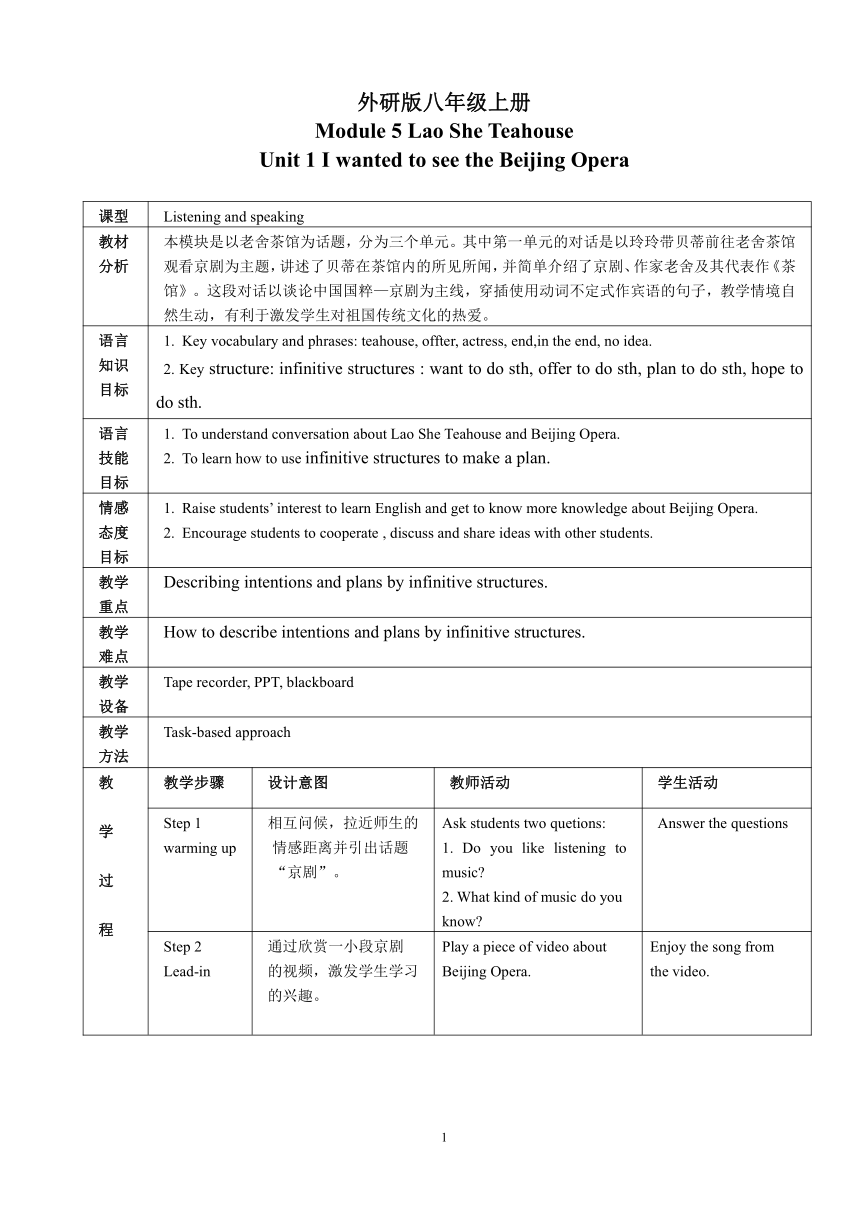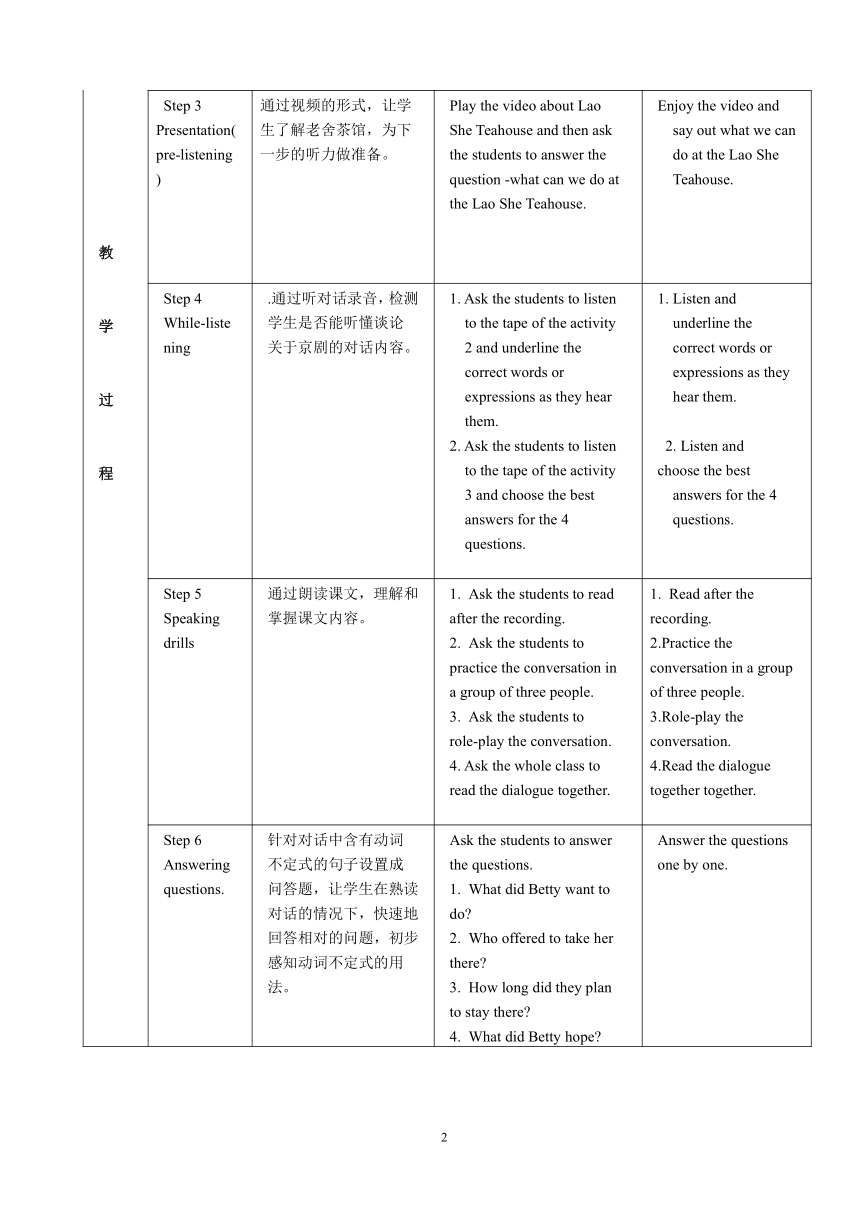Module 5 Unit 1 I wanted to see the Beijing Opera 教案(表格式)
文档属性
| 名称 | Module 5 Unit 1 I wanted to see the Beijing Opera 教案(表格式) |

|
|
| 格式 | doc | ||
| 文件大小 | 62.0KB | ||
| 资源类型 | 教案 | ||
| 版本资源 | 外研版 | ||
| 科目 | 英语 | ||
| 更新时间 | 2022-12-06 00:00:00 | ||
图片预览


文档简介
外研版八年级上册
Module 5 Lao She Teahouse
Unit 1 I wanted to see the Beijing Opera
课型 Listening and speaking
教材分析 本模块是以老舍茶馆为话题,分为三个单元。其中第一单元的对话是以玲玲带贝蒂前往老舍茶馆观看京剧为主题,讲述了贝蒂在茶馆内的所见所闻,并简单介绍了京剧、作家老舍及其代表作《茶馆》。这段对话以谈论中国国粹—京剧为主线,穿插使用动词不定式作宾语的句子,教学情境自然生动,有利于激发学生对祖国传统文化的热爱。
语言知识目标 Key vocabulary and phrases: teahouse, offter, actress, end,in the end, no idea. 2. Key structure: infinitive structures : want to do sth, offer to do sth, plan to do sth, hope to do sth.
语言技能目标 To understand conversation about Lao She Teahouse and Beijing Opera.To learn how to use infinitive structures to make a plan.
情感态度目标 Raise students’ interest to learn English and get to know more knowledge about Beijing Opera.Encourage students to cooperate , discuss and share ideas with other students.
教学重点 Describing intentions and plans by infinitive structures.
教学难点 How to describe intentions and plans by infinitive structures.
教学设备 Tape recorder, PPT, blackboard
教学方法 Task-based approach
教学过程教学过程 教学步骤 设计意图 教师活动 学生活动
Step 1 warming up 相互问候,拉近师生的情感距离并引出话题“京剧”。 Ask students two quetions:1. Do you like listening to music 2. What kind of music do you know Answer the questions
Step 2Lead-in 通过欣赏一小段京剧的视频,激发学生学习的兴趣。 Play a piece of video about Beijing Opera. Enjoy the song from the video.
Step 3Presentation(pre-listening) 通过视频的形式,让学生了解老舍茶馆,为下一步的听力做准备。 Play the video about Lao She Teahouse and then ask the students to answer the question -what can we do at the Lao She Teahouse. Enjoy the video and say out what we can do at the Lao She Teahouse.
Step 4 While-listening .通过听对话录音,检测学生是否能听懂谈论关于京剧的对话内容。 1. Ask the students to listen to the tape of the activity 2 and underline the correct words or expressions as they hear them.2. Ask the students to listen to the tape of the activity 3 and choose the best answers for the 4 questions. 1. Listen and underline the correct words or expressions as they hear them. 2. Listen and choose the best answers for the 4 questions.
Step 5Speaking drills 通过朗读课文,理解和掌握课文内容。 Ask the students to read after the recording. Ask the students to practice the conversation in a group of three people.Ask the students to role-play the conversation.4. Ask the whole class to read the dialogue together. Read after the recording. 2.Practice the conversation in a group of three people.3.Role-play the conversation.4.Read the dialogue together together.
Step 6Answering questions. 针对对话中含有动词不定式的句子设置成问答题,让学生在熟读对话的情况下,快速地回答相对的问题,初步感知动词不定式的用法。 Ask the students to answer the questions.What did Betty want to do Who offered to take her there How long did they plan to stay there What did Betty hope Answer the questions one by one.
Step 7 Summary 通过总结对话中出现的4个动词不定式的短语,让学生加深印象。 Have a summary : We can use four phrases to make a plan.want to do sth. offter to do sth.plan to do sth. hope to do sth. Recall what these four phrases are and say them out.
Step 8Look and say 结合课文对话,设计含有四个动词不定式的对话框架,让学生先看图操练两次,然后熟读对应的对话,为接下来的输出活动做铺垫。 Ask the students to look at the pictures and talk about the plans Ask the students to role-play the conversation. Ask the whole class to read the conversation. Look at the pictures and talk about the plans. Boys ask and girls answer to role-play the conversation. Read the conversation together.
Step 9Speaking 让学生使用含有动词不定式的句子询问他人或者描述自己的周末计划,检测他们是否掌握动词不定式的用法、是否学会用动词不定式简单描述自己的活动计划。 Ask students to ask her/his friend’s plan for the weekend.Invite three pairs of students to talk about their plans. Use the infinitive structures to make a plan in Nanning. Talk about the plan for the weekend in pair.
Step 10Revision 对本节课4个重点的动词不定式的短语进行复习,强化学生的记忆。 Have a revision of how to make a plan:1.want to do sth. 2. offter to do sth.3. plan to do sth. 4. hope to do sth. Read the phrases together.
Step 11Emotional learning 培养学生对中国传统文化—京剧的兴趣和热爱,增强其民族自豪感。 Tell the students that Beijing Opera is the quintessence of Chinese culture and we should enjoy and be proud of them. Read the sentence:Enjoy Beijing Opera and be proud of Chinese culture.
Step 12Homework 通过书写性作业,检测学生对对话的理解, Show the homework Write down the homework.
板书设计
M5 Unit 1
I wanted to see the Beijing Opera
板书:
want to do sth 想要去做某事
offter to do sth 提议去做某事
plan to do sth 计划去做某事
hope to do sth 希望去做某事
PAGE
4
Module 5 Lao She Teahouse
Unit 1 I wanted to see the Beijing Opera
课型 Listening and speaking
教材分析 本模块是以老舍茶馆为话题,分为三个单元。其中第一单元的对话是以玲玲带贝蒂前往老舍茶馆观看京剧为主题,讲述了贝蒂在茶馆内的所见所闻,并简单介绍了京剧、作家老舍及其代表作《茶馆》。这段对话以谈论中国国粹—京剧为主线,穿插使用动词不定式作宾语的句子,教学情境自然生动,有利于激发学生对祖国传统文化的热爱。
语言知识目标 Key vocabulary and phrases: teahouse, offter, actress, end,in the end, no idea. 2. Key structure: infinitive structures : want to do sth, offer to do sth, plan to do sth, hope to do sth.
语言技能目标 To understand conversation about Lao She Teahouse and Beijing Opera.To learn how to use infinitive structures to make a plan.
情感态度目标 Raise students’ interest to learn English and get to know more knowledge about Beijing Opera.Encourage students to cooperate , discuss and share ideas with other students.
教学重点 Describing intentions and plans by infinitive structures.
教学难点 How to describe intentions and plans by infinitive structures.
教学设备 Tape recorder, PPT, blackboard
教学方法 Task-based approach
教学过程教学过程 教学步骤 设计意图 教师活动 学生活动
Step 1 warming up 相互问候,拉近师生的情感距离并引出话题“京剧”。 Ask students two quetions:1. Do you like listening to music 2. What kind of music do you know Answer the questions
Step 2Lead-in 通过欣赏一小段京剧的视频,激发学生学习的兴趣。 Play a piece of video about Beijing Opera. Enjoy the song from the video.
Step 3Presentation(pre-listening) 通过视频的形式,让学生了解老舍茶馆,为下一步的听力做准备。 Play the video about Lao She Teahouse and then ask the students to answer the question -what can we do at the Lao She Teahouse. Enjoy the video and say out what we can do at the Lao She Teahouse.
Step 4 While-listening .通过听对话录音,检测学生是否能听懂谈论关于京剧的对话内容。 1. Ask the students to listen to the tape of the activity 2 and underline the correct words or expressions as they hear them.2. Ask the students to listen to the tape of the activity 3 and choose the best answers for the 4 questions. 1. Listen and underline the correct words or expressions as they hear them. 2. Listen and choose the best answers for the 4 questions.
Step 5Speaking drills 通过朗读课文,理解和掌握课文内容。 Ask the students to read after the recording. Ask the students to practice the conversation in a group of three people.Ask the students to role-play the conversation.4. Ask the whole class to read the dialogue together. Read after the recording. 2.Practice the conversation in a group of three people.3.Role-play the conversation.4.Read the dialogue together together.
Step 6Answering questions. 针对对话中含有动词不定式的句子设置成问答题,让学生在熟读对话的情况下,快速地回答相对的问题,初步感知动词不定式的用法。 Ask the students to answer the questions.What did Betty want to do Who offered to take her there How long did they plan to stay there What did Betty hope Answer the questions one by one.
Step 7 Summary 通过总结对话中出现的4个动词不定式的短语,让学生加深印象。 Have a summary : We can use four phrases to make a plan.want to do sth. offter to do sth.plan to do sth. hope to do sth. Recall what these four phrases are and say them out.
Step 8Look and say 结合课文对话,设计含有四个动词不定式的对话框架,让学生先看图操练两次,然后熟读对应的对话,为接下来的输出活动做铺垫。 Ask the students to look at the pictures and talk about the plans Ask the students to role-play the conversation. Ask the whole class to read the conversation. Look at the pictures and talk about the plans. Boys ask and girls answer to role-play the conversation. Read the conversation together.
Step 9Speaking 让学生使用含有动词不定式的句子询问他人或者描述自己的周末计划,检测他们是否掌握动词不定式的用法、是否学会用动词不定式简单描述自己的活动计划。 Ask students to ask her/his friend’s plan for the weekend.Invite three pairs of students to talk about their plans. Use the infinitive structures to make a plan in Nanning. Talk about the plan for the weekend in pair.
Step 10Revision 对本节课4个重点的动词不定式的短语进行复习,强化学生的记忆。 Have a revision of how to make a plan:1.want to do sth. 2. offter to do sth.3. plan to do sth. 4. hope to do sth. Read the phrases together.
Step 11Emotional learning 培养学生对中国传统文化—京剧的兴趣和热爱,增强其民族自豪感。 Tell the students that Beijing Opera is the quintessence of Chinese culture and we should enjoy and be proud of them. Read the sentence:Enjoy Beijing Opera and be proud of Chinese culture.
Step 12Homework 通过书写性作业,检测学生对对话的理解, Show the homework Write down the homework.
板书设计
M5 Unit 1
I wanted to see the Beijing Opera
板书:
want to do sth 想要去做某事
offter to do sth 提议去做某事
plan to do sth 计划去做某事
hope to do sth 希望去做某事
PAGE
4
同课章节目录
- Module 1 How to learn English
- Unit 1 Let's try to speak English as much as possi
- Unit 2 You should smile at her.
- Unit 3 Language in use .
- Module 2 My home town and my country
- Unit 1 It's taller than many other buildings.
- Unit 2 Cambridge is a beautiful city in the east o
- Unit 3 Language in use .
- Module 3 Sports.
- Unit 1 Nothing is more exciting than playing tenni
- Unit 2 This year we training more carefully.
- Unit 3 Language in use .
- Module 4 Planes, ships and trains .
- Unit 1 He lives the farthest from school.
- Unit 2 What is the best way to travel.
- Unit 3 Language in use .
- Module 5 Lao She Teahouse.
- Unit 1 I wanted to see the Beijing Opera.
- Unit 2 It descibes the changes in Chinese society.
- Unit 3 Language in use .
- Module 6 Animals in danger.
- Unit 1 It allows people to get closer to them .
- Unit 2 The WWF is working hard to save them all.
- Unit 3 Language in use .
- Revision module A
- Module 7 A famous story
- Unit 1 Alice was sitting with her sister by the ri
- Unit 2 She was thinking about her cat.
- Unit 3 Language in use .
- Module 8 Accidents
- Unit 1 While the car were changing to red, a car s
- Unit 2 I was trying to pick it up when it bite me
- Unit 3 Language in use .
- Module 9 Population
- Unit 1 The population of China is about 1.37 billi
- Unit 2 Arnwick was a city with 200,000 people.
- Unit 3 Language in use .
- Module 10 The weathe
- Unit 1 It might snow.
- Unit 2 The weather is fine all year round.
- Unit 3 Language in use .
- Module 11 Way of life
- Unit 1 In China ,we open a gift later.
- Unit 2 In England, you usually drink tea with milk
- Unit 3 Language in use .
- Module 12 Help
- Unit 1 What should we do before help arrives?
- Unit 2 Stay away from windows and heavy furniture.
- Unit 3 Language in use .
- Revision module B
